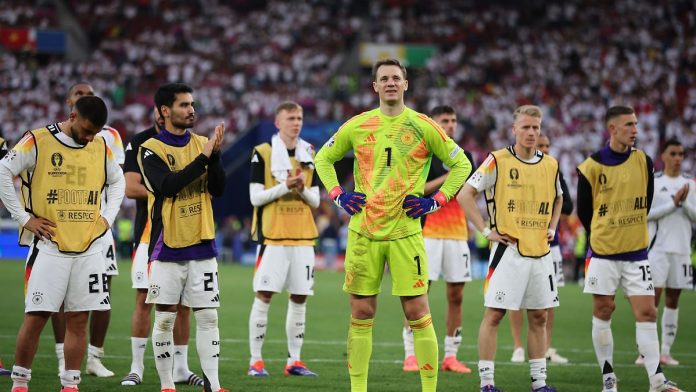A turning point in the DFB goal
World champion Neuer ends career in the national team
Manuel Neuer is retiring from the national team. He wants to concentrate on FC Bayern in the future. He is still under contract there for another year. But after 124 international matches, 61 of them as captain, his time at the DFB is over.
The last world champion says goodbye – Manuel Neuer is ending his career in the German national football team after 15 years as number one and 124 international matches. The 38-year-old announced the end of an era in the German goal ten years after the 2014 World Cup triumph a little wistfully but determinedly on Wednesday.
“After long and intensive discussions with my family and friends, I have decided to end my career in the national team,” said Neuer. Everyone who knows him knows that this was “not an easy decision” for him: “I feel very good physically and of course the 2026 World Cup would have appealed to me a lot. At the same time, I am convinced that now is exactly the right time to take this step and to concentrate fully on FC Bayern Munich in the future.” He informed national coach Julian Nagelsmann in a “trustful and appreciative conversation.”
When a five-year-old boy showed up at Schalke 04 training in March 1991, the world career of arguably the best goalkeeper ever was not yet foreseeable. Manuel Neuer grew up as the son of a policeman in Gelsenkirchen-Buer, and his sporting career began to take shape in 2000 when he moved to the elite football school Berger Feld – a stone's throw from the Schalke Arena.
Tournament debut at the 2010 World Cup in South Africa
As a youth player he was allowed to play in the second team, and in the 2005/06 season he became FC Schalke's third goalkeeper. His first Bundesliga appearance on August 19, 2006, against Alemannia Aachen, was a rocket boost for his career: Frank Rost had been injured, and Neuer was suddenly the first-choice goalkeeper.
He established himself and soon showed spectacular performances in the Champions League and, from 2009, also for the national team. This included the 2010 World Cup, where he was allowed to play after Rene Adler was injured: strong in the air, outstanding on the line, excellent with his feet.
From 2011 onwards he was with FC Bayern, which made Neuer enemies on both sides. At Schalke they called him “Judas”, the Munich fans held up signs saying “No Neuer”, but they quickly stopped doing that in view of his sensational saves. Ultimately, Manuel Neuer revolutionised goalkeeping, bringing it into the modern age – with the World Cup in Brazil culminating.
The revelations at the 2014 World Cup
His performance there was a revelation. Yes, he was still guarding the goal as a goalkeeper. But he also thought ahead, initiated, and prevented dangerous situations with breakneck trips from the halfway line. Probably never before or since has a goalkeeper played such a good World Cup – “an experience that will stay with us for the rest of our lives,” as he himself says.
What a career. What would have been possible if Neuer hadn't been repeatedly injured? Metatarsal fractures are worth mentioning, as is the fatal accident while touring with almost a year's break in 2022. “No way: we'll drink apricot schnapps in the hut and race down,” he later said about it. “That was training – regeneration for the body and psyche. I've skied this route countless times.” This time he fell and broke his lower leg.
This is also why the question arose as to what a top athlete is willing to put his battered body through. Neuer has answered it – enough is enough. The European Championship quarter-final defeat against Spain on July 5th will be his last tournament game, and he will certainly receive a grand farewell from the DFB. His contract with Bayern runs until 2025.
His departure is a turning point for the national team. Now Neuer's permanent deputy Marc-Andre ter Stegen will have his chance. Finally! He has been FC Barcelona's regular goalkeeper for ten years and yet was never the German number one. “He is another world-class goalkeeper who is waiting for his chance,” said DFB sports director Rudi Völler, “we have no worries.”


